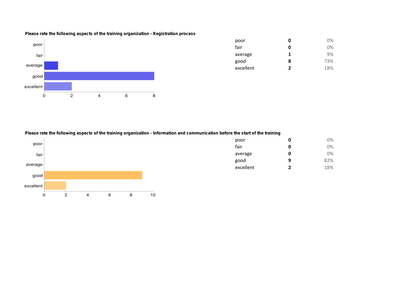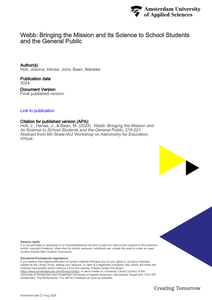This publication is a report of the summer research School symbiocene, which took place at Zeeburgereiland amsterdam between the 28th and 30th of june 2023. This summer research school is anInitiative of an kramer, action researcher of the Symbiocene, in collaboration with Inholland University of applied sciences and sluislab, social Impact island.
DOCUMENT

First year students Aeronautical Engineering had the opportunity to enter a five days program to enhance their mathematical skills. The program had 55 participants. Our research questions were: What are the effects of participation in the summer school program on math skills? Do participants experience more motivation and academic self-esteem after participation? Do dropout rates differ between participating and non-participating students? Do participants differ from non-participating students in motivation or academic self-esteem? We presented the results at the European First Year Experience in Cork, Ireland.
DOCUMENT

Kick-Start College is a three-day pre-academic program (summer school) for prospective first year students of Inholland Rotterdam, University of Applied Sciences. The aim is to integrate students academically and socially, which could make the transition to higher education easier and eventually lead to lower dropout rates of students. Research has been conducted on both student experiences with the program as well as effects of the program. Method: pretest-posttest with academic-, social-, professional- and university integration1, self-esteem, motivation, evaluation.
DOCUMENT

One of the work packages which Hanzehogeschool emphatically has a role, is Research and Training. In the Summer Academy teachers are trained by translating their knowledge back to their own schools.The Summer Academy is given on 27-30 May 2013, as part of "Opening Up". This project aims to find better service to citizens and businesses through the use of social media and open data. The opening-up project started in October 2011 and lasts three years. Hanze University Groningen is an important partner in the project.
DOCUMENT

This article discusses Deep Mapping in Geography teaching and learning by drawing on a case study of a summer school organised during the COVID-19 pandemic. Deep Mapping was used to foster deep learning among the students and teach them about a distant place and people. The exercise tasked the students to work on the creation of layered maps representing the fieldwork site, the city of Vancouver, Canada. Critical student reflections about the Deep Mapping process are used to address some of the benefits and challenges. The Deep Mapping exercise stimulated the students to critically engage with the diverse summer school materials, move beyond a superficial view of the city, maps and mapping, and reflect on their positionality. The method is promising in light of making deep engagement with other places more accessible to those who might not have or be inclined to access such international educational experience and also offers another opportunity for blended learning. In conclusion, we argue that Deep Mapping offers a timely and highly engaging approach to learn about a place and people from another part of the world – be it on location or at a distance.
DOCUMENT
This paper investigates whether encouraging children to become more physically active in their everyday life affects their primary school performance. We use data from a field quasi‐experiment called the Active Living Program, which aimed to increase active modes of transportation to school and active play among 8‐ to 12‐year‐olds living in low socioeconomic status (SES) areas in the Netherlands. Difference‐in‐differences estimations reveal that while the interventions increase time spent on physical activity during school hours, they negatively affect school performance, especially among the worst‐performing students. Further analyses reveal that increased restlessness during instruction time is a potential mechanism for this negative effect. Our results suggest that the commonly found positive effects of exercising or participating in sports on educational outcomes may not be generalizable to physical activity in everyday life. Policymakers and educators who seek to increase physical activity in everyday life need to weigh the health and well‐being benefits against the probability of increasing inequality in school performance.
DOCUMENT

One of the work packages which Hanzehogeschool emphatically has a role, is Research and Training. In the Summer Academy teachers are trained by translating their knowledge back to their own schools.The Summer Academy is given on 27-30 May 2013, as part of "Opening Up". This project aims to find better service to citizens and businesses through the use of social media and open data. The opening-up project started in October 2011 and lasts three years. Hanze University Groningen is an important partner in the project.
DOCUMENT

Background: The worldwide increase in the rates of childhood overweight and physical inactivity requires successful prevention and intervention programs for children. The aim of the Active Living project is to increase physical activity and decrease sedentary behavior of Dutch primary school children by developing and implementing tailored, multicomponent interventions at and around schools. Methods/design: In this project, school-centered interventions have been developed at 10 schools in the south of the Netherlands, using a combined top-down and bottom-up approach in which a research unit and a practice unit continuously interact. The interventions consist of a combination of physical and social interventions tailored to local needs of intervention schools. The process and short- and long-term effectiveness of the interventions will be evaluated using a quasi-experimental study design in which 10 intervention schools are matched with 10 control schools. Baseline and follow-up measurements (after 12 and 24 months) have been conducted in grades 6 and 7 and included accelerometry, GPS, and questionnaires. Primary outcome of the Active Living study is the change in physical activity levels, i.e. sedentary behavior (SB), light physical activity (LPA), moderate-to-vigorous physical activity (MVPA), and counts-per-minute (CPM). Multilevel regression analyses will be used to assess the effectiveness of isolated and combined physical and social interventions on children’s PA levels. Discussion: The current intervention study is unique in its combined approach of physical and social environmental PA interventions both at school(yard)s as well as in the local neighborhood around the schools. The strength of the study lies in the quasi-experimental design including objective measurement techniques, i.e. accelerometry and GPS, combined with more subjective techniques, i.e. questionnaires, implementation logbooks, and neighborhood observations. LinkedIn: https://www.linkedin.com/in/sanned/
DOCUMENT

Met betrekking tot het doel van de summerschools die aan het onderzoek hebben deelgenomen is een driedeling zichtbaar, op basis van twee ingrediënten, namelijk het wegwerken van deficiënties, het binden & boeien van studenten of een combinatie van beide. Over het algemeen wordt aangegeven dat de summerschool voor alle studenten is bedoeld. Een aantal summerschools geeft wel aan dat een bepaald type student mogelijk meer kan profiteren van de summerschool. Bij een aantal summerschools wordt bepaalde groepen studenten zodoende extra aangeraden om deel te nemen aan de summerschool.
DOCUMENT

The JWST captures the imagination of the world, inspiring all bothyoung and old. From technological challenges and its ‘origamimirror’ to its powerful cameras looking deeper into the universethan ever before, JWST is fascinating on all levels. With the MIRI-instrument being built in the Netherlands, the mission also hasspecial national interest. With this in mind, NOVA coordinateda number of activities bringing JWST and its science to a broadcross-section of the Dutch population. The activities included press events, live webcasts, educational webinars for school students and teachers, and themed planetarium shows with expert guest speakers, taking place from prior to launch - summer 2024. In this talk we give an overview with particular focus on the content choices made.
DOCUMENT
